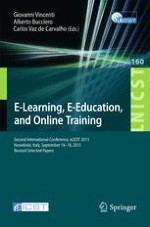2016 | Buch
E-Learning, E-Education, and Online Training
Second International Conference, eLEOT 2015, Novedrate, Italy, September 16-18, 2015, Revised Selected Papers
herausgegeben von: Giovanni Vincenti, Alberto Bucciero, Carlos Vaz de Carvalho
Verlag: Springer International Publishing
Buchreihe : Lecture Notes of the Institute for Computer Sciences, Social Informatics and Telecommunications Engineering
